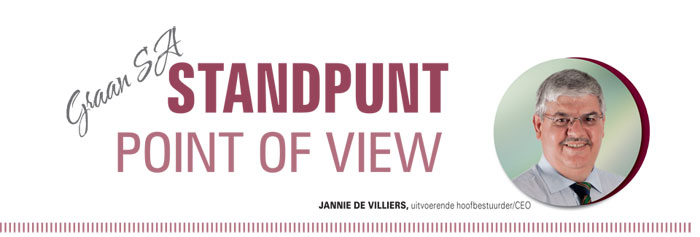July 2015

JANNIE DE VILLIERS, uitvoerende hoofbestuurder/CEO
The other evening I was sitting in the news studio in Pretoria waiting for my interview with the news reader in Johannesburg. The main news was about our president’s housing, the cost thereof and who should be paying for it.
Thereafter the story about the alleged bribe money South Africa paid to be the host country for the 2010 Soccer World Cup followed; and the same day the person who chaired the Pilot Committee is elected as the mayor of the Nelson Mandela Metropole.
Then it was my interview: “Mr De Villiers, today is World Hunger Day, how is South Africa faring in this regard?” At that moment I wanted to shout it out that the money just referred to in the news item could rather have been given to poor people to battle the famine in our country. What has happened to our country?
The positive, however, is that the number of poor people in our country are nominally and proportionally declining. South Africa has already achieved the United Nations’ millennium goal by halving the number of people living on US per day.
In fact, we have also halved the number of people living on less than US,50 per day within the set time frame. That is actually good news. One could just imagine what we could have achieved were there not so much corruption.
This year the grain industry is facing difficult times. The producers in the north keep tapping the monitors of the combines to check whether they had not perhaps stopped; while in the south the producers are watching the weather. With the writing of this article, the Cape had not yet had rain, so the season there is starting off dry. The way things are now, the sharp edge of climate change is upon us. These events force producers to over and over consider conservation tillage and fallow season systems. Sustainable grain production indeed has many aspects to take into consideration.
The so called “line in the sand” that Grain SA drew about the minister’s so called land reform plans during the NAMPO Harvest Day, in fact did draw some fire. Uncle Fanie always said: “If the jackal howls, the shot was true!” The minister called some of the role-players together to establish why we have criticised him in public.
The discussion was good and the frankness and honesty of it encouraged me to believe that a negotiated settlement might still be found. However, it remains a difficult issue and there are divergent goals among the different groups. Standing together, as always, is our Achilles heel.
Every party plays to a different pavilion. Patience wanes and levels of frustration run very high. Our faith is also tested and for me it is a miracle each time discussions of this nature do not leave the country in chaos.
Finally, on behalf of Grain SA, I wish to congratulate the new team appointed at Agri SA and to wish them courage. I thought it to be a very clear message that organised agriculture was bringing in reinforcements and was not flinching from the current challenges.
Grain SA is looking forward to working together in the search for new solutions. It was a pleasure to have Omri van Zyl and Thabi Nkosi as our guests at NAMPO to give them a first class introduction to the grain industry.
Publication: July 2015
Section: Features